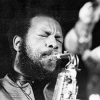Ornette Coleman

Ornette Coleman
Randolph Denard Ornette Colemanwas an American jazz saxophonist, violinist, trumpeter, and composer. He was one of the major innovators of the free jazz movement of the 1960s, a term he invented with the name of an album. Coleman's timbre was easily recognized: his keening, crying sound drew heavily on blues music. He was awarded a MacArthur Fellowship in 1994. His album Sound Grammar received the 2007 Pulitzer Prize for music...
NationalityAmerican
ProfessionSaxophonist
Date of Birth9 March 1930
CityFort Worth, TX
CountryUnited States of America
I don't know what they're thinking about. Just because someone says, 'I like what you do' or something: They might like it today and tomorrow they might not. I've had that experience with record companies.
No one has to learn to spell to talk, right? You see a little kid holding a conversation with an adult. He probably doesn't know the words he's saying, but he knows where to fit them to make what he's thinking logical to what you're saying.
Originally, I wanted to be a composer. I always tell people, 'I think of myself as a composer.
I don't really live like a musician myself. I think music is just something that I do, but I'd like to be doing lots of other things. I like to cure all kinds of illness.
I'm having this conversation with you now. I'm talking, but I'm thinking, feeling, smelling, and moving. Yet I'm concentrating on what you're saying. So that means there's more things going on in the body than just the present thing that the person's got you doing.
I think that those elements - light and sound - are beyond democratic. They're into the creative part of life.
Music has many uses and I think the most perfected use that music has is one of a healing quality.
That's what I was trying to say when we were talking about sound. I think that every person, whether they play music or don't play music, has a sound - their own sound, that thing that you're talking about.
So, for instance, if you came to me, I'd ask, 'Do you want to write? Do you want to improvise? Why do you want to play this instrument? What do you want to do?'
So, for instance, if you came to me, I'd ask,'Do you want to write? Do you want to improvise? Why do you want to play this instrument? What do you want to do?'
Music is the say way. If you desire to play it or write it, then you have to get more information. But the end result is that you play music.
Those things are the results of what people see and hear that you do. But the human beings themselves are living on a multiple level.
I've been playing with Blackwell over 20 years. We used to play when I first went to Los Angeles. Blackwell plays the drums as if he's playing a wind instrument. Actually, he sounds more like a talking drum.
I remember once, we got an interview, and he said, 'Dad, these people are writing about me like I'm an adult. Don't they know I'm a kid?' I have never tried to encourage him to get a music image like other musicians have.